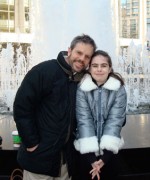Column Name
Title
Associate principal percussionist of the New York Philharmonic, Daniel Druckman has been with the orchestra since 1991 (when he also joined the Juilliard faculty). He earned both his bachelor’s and master’s degrees from the School, and has served as chairman of the percussion department since 2004.
Body
When did you first know you wanted to be a musician and how did you know it?
My father [composer Jacob Druckman] was a musician, so I was surrounded by music and by performers from a very young age. I’m not sure there was ever a conscious decision made, but it seemed to become increasingly inevitable by age 12 or so, as I experienced some success with it.
Who was the teacher or mentor who most inspired you when you were growing up and what did you learn from that person?
I’ve been very lucky to have some incredible teachers: Saul Goodman, Gordon Gottlieb, Justin DiCioccio. Perhaps my most important influence was Buster Bailey, who was my teacher in high school and my predecessor at the New York Philharmonic. Buster taught me so much, but two things above all stand out: first, that pursuit of technical excellence could be so much fun, and so rewarding on an artistic and an intellectual basis; and second, the paramount importance of “feel,” and the way that subtle inflection and lilt can propel and transform music of any kind.
What was the first recording that you remember hearing, and what was its significance to you?
I remember that Rimsky-Korsakov’s Scheherazade had a very profound impact on me, just illustrating the power and color and incredible richness of the orchestra. And I think Firebird and The Rite of Spring soon followed, and then I was hooked.
What’s the most embarrassing moment you’ve had as a performer?
Several embarrassing moments involved forgetting to bring a specific instrument or mallet onstage with me. But I still think my personal high-water mark has to be the performance of Mahler’s Symphony No. 6 with the Philharmonic, when I was playing the hammer blows in the last movement, and took out part of the Avery Fisher Hall wall with my backswing!
If your students could only remember one thing from your teaching, what would you want it to be?
I want them to always fully realize their potential, to do whatever is necessary to get up onstage knowing they are thoroughly prepared and ready to do their best, to do justice to the music and to their own abilities and talents. This does not happen nearly as much as it should at Juilliard, or in the music world in general.
What is your favorite thing about New York City?
One of my favorite places in New York is definitely the Museum of Modern Art. It’s such a populist (and popular!), down-to-earth place, which still manages to house some of the absolute pinnacles of Western art—works of astounding power and beauty. Sometimes it is just too crowded to take, but at its best, I think it exemplifies the best of New York: excellence without pretension.
What book are you reading right now?
Right now I’m reading (or, trying to finish) Orhan Pamuk’s The Black Book, which is a dense, intense parable about identity. Like most of his work, it is set in Istanbul, where it seems to be eternally and irrevocably dark and cold and rainy and grey.
If you weren’t in the career you are in, what would you be doing?
Certainly something in the humanities; I have no aptitude for science or math or business. I’d like to think that I could have been a writer, which is something that I enjoy, but am extremely slow at. So perhaps I would have been avery slow writer …
What would people be surprised to know about you?
Perhaps people who only know me professionally are not aware that I have a teenage daughter with autism. And as anyone who has raised a disabled kid knows, this is a sometimes challenging but incredibly enriching and life-changing experience, one that I would never exchange. It has broadened and changed me so significantly, and forced me to think beyond the parochial concerns of music and career. And through it I’ve met an entire world of dedicated, brilliant, selfless professionals that I don’t think I would have otherwise encountered. So much of my “free” time is spent helping my daughter learn and raising funds for her school.





